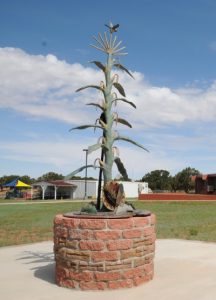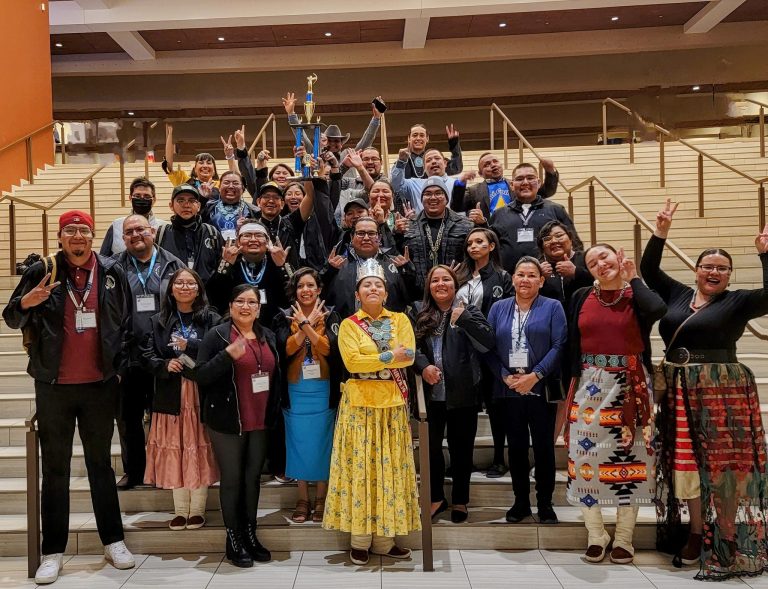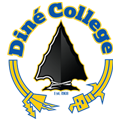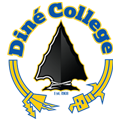Bachelor of Arts in Psychology (B.A.)
The Culturally-based Bachelor of Arts in Psychology at Diné College implements the Diné paradigm of Nits1h1kees (Thinking and Conceptualizing), Nahat’1 (Planning and Gathering Information), &in1 (Living and Achieving), and Siihasin (Evaluation and Competency) to provide students with both Navajo and Western psychological expertise needed to promote mental health and H0zh0 (balance) for individuals, families, and communities. This program provides courses and training that will enable students to pursue graduate studies, obtain employment and promotion in the workforce, and serve the Navajo Nation.


Bachelor of Arts in Psychology (B.A.)
The 4-years program includes instruction in Navajo psychology, counseling and clinical psychology, health psychology, psychology and law, social and cultural psychology, developmental, as well as decolonization, resilience, and research in indigenous communities. This program also includes hands-on practical experience through internships, undergraduate research projects, or independent study. Students will become informed about educational and career opportunities and will create a portfolio outlining a post-graduation plan that showcases skills and knowledge. The program is offered on a full-time basis at the Tsaile Campus.
Admission criteria are as follows:
- Completion of an A.A. in Social and Behavior (based on the College’s 2015-2016 or more recent catalog). Any other Associate degree will require students to take additional course that meets requirements of Diné College’s A.A. in Social and Behavioral Sciences.
- Completion of the following courses
- PSY 111 Introduction to Psychology
- PSY 213 Statistics
- PSY 290 Research Methods\
- ANT 201 Ethnographic Methods
- ANT 225 or HST 234 or SOC 215 (Indians of the United States and North America, History of Native Americans: Pre-Contact to the Modern Age, Native Americans in American Society)
| General Education Core | Credits |
| Communications ENG 101: Freshman English I ENG 102: Freshman English II |
6 |
| Humanities and Fine Arts Students must choose two courses from: Art History (ARH) English (ENG) 212, 213, 231, 233, 234, 241, 297 Fine Arts (FA) Humanities (HUM) Theater (THR) 101, 102 |
6 |
| Mathematics Student must take appropriate course based on major. MTH 110: College Algebra MTH 114: College Mathematics MTH 106: Survey on College Mathematics |
3-4 |
| Social and Behavioral Science Students must choose one History (HST) 101, 102, 135, 136 course and one other course from: Anthropology (ANT) Sociology (SOC) Social Work (SWO) Social Science (SSC) Political Science (POS) Economics (ECO) Psychology (PSY) |
6 |
| Laboratory Science Students must choose one Life Science and one Physical Science course both with labs from: Life Science: BIO Physical Science: AGR, AST, CHM, ENV, GLG, PHY, PHS |
8 |
| Physical Education and Health Education PEH 122 PEH 113-148 Health Education (HEE) HEE 110, 111, 112 |
2-3 |
| Navajo Studies One Navajo Language Course Based on Placement Test (NAV 101, 102, 201, 202, or 211) NIS 111: Foundations of Navajo Culture and NIS 221: Navajo History to Present 9-10 |
2-3 |
| Required Core Total Students transferring may need to take additional courses to meet core requirements. | 40-43 |
| Lower Division Requirements | 24 Credits |
| ACC 200 Financial Accounting | 3 |
| ACC 201 Managerial Accounting | 3 |
| BUS 204 Business Law | 3 |
| BUS 265 Statistical Analysis for Business | 3 |
| BUS 270 Quantitative Methods in Business | 3 |
| CIS 111 Introduction to Computers | 3 |
| ECO 201 Principles of Microeconomics | 3 |
| MKT 240 Marketing | 3 |
| Semester I | Credits |
| PSY 200 Decolonization and Resilience in Indigenous Communities | 3 |
| PSY 202 Career Explorations in Psychology | 2 |
| PSY 211 Introduction to Navajo Psychology | 3 |
| PSY 240 | 3 |
| PSY 291 Introduction to Counseling | 3 |
| Program Credits | 14 |
| SEMESTER II | Credits |
| NIS 311 Introduction to Navajo Holistic Healing | 3 |
| NIS 371 Navajo Philosophy | 3 |
| PSY 241 Abnormal Psychology | 3 |
| PSY 250 Social Psychology | 3 |
| PSY 255 Introduction to Physiological Psychology | 3 |
| Program Credits | 15 |
| SEMESTER III | Credits |
| PSY 315 Health Psychology | 3 |
| PSY 325 Psychology and Law | 3 |
| PSY 340 Child and Adolescent Development | 3 |
| PSY 350 Cultural Psychology | 3 |
| PSY 360 Drug Use and Abuse | 3 |
| Program Credits | 15 |
| Senior SEMESTER IV | Credits |
| BUS 480 Internship | 3 |
| CIS 420 Management Information Systems | 3 |
| ECO 460 Tribal Economic Issues and Development Strategies | 3 |
| MGT 450 Strategic Management | 3 |
| MGT 460 Tribal Leadership Challenges | 3 |
| Program Credits | 15 |
| Two 200-level Navajo Language Courses based on Placement Test | |
| NAV 201 or 202 or 211 or 212 or 231 or 289 | 3 or 4 |
| NAV 201 or 202 or 211 or 212 or 231 or 289 | 3 or 4 |
| Program Credits | 6-8 |
*Choose one Life Science with lab from BIO; and one Physical Science with lab from: AGR, AST, CHM, ENV, GLG, PHY or PHS on the Associate of Science Degree Checklist.
| Program Classification of Instructional Program (CIP) Code Code Title |
| 52.0201 Business Administration and Management, General. |
| Degree Earned | Credits |
| General Education | 40-43 |
| Lower Division Program Requirements | 23 |
| Upper Division Program Requirements | 58-60 |
| Total Credits Earned: | 121-126 |
| Elective (must be NAV 102 if needed for 200-level Navajo Language Course) | Credits |
| NAV 102 or other | 3 |
| Program Classification of Instructional Program (CIP) Code Code Title |
| 42.0101 Psychology, General. |
Psychology B.A. Program Advisors
Tsaile/Chinle/Window Rock
Calvin Dominguez
928-724-6861
cdominguez@dinecollege.edu
Bruce Bradway
(Psychology Faculty)
928-724-6620
bbradway@dinecollege.edu

